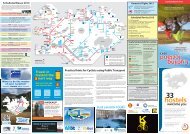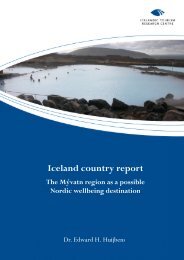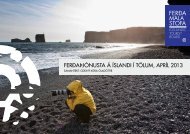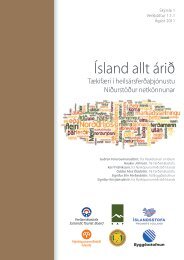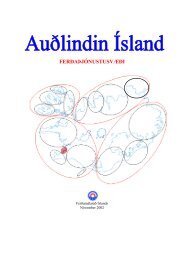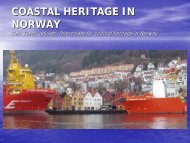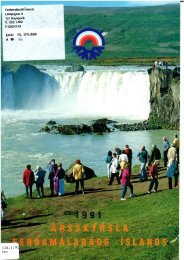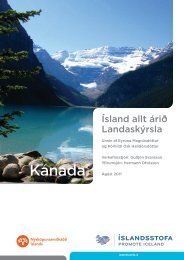Untitled
Untitled
Untitled
You also want an ePaper? Increase the reach of your titles
YUMPU automatically turns print PDFs into web optimized ePapers that Google loves.
Tourism – an earthly business<br />
For us the tourist and tourism imaginationing is about the social, cultural<br />
and geographical context of tourism, but within the triad’s geographical<br />
focus, the Earth itself emerges. The important role that non-humans, like<br />
boulders, aeroplanes, landscapes and cars, play in tourism clearly implies<br />
that tourism is something that takes place on planet Earth.<br />
That the Earth becomes an explicit plane of reference on which<br />
tourism takes place may well sound like a self-evident and trivial truism.<br />
Yet, an earthly take does not only mean that tourism is very much about<br />
being and experiencing something somewhere, but also has consequences<br />
for tourism theory. One of these is that it puts a question mark around onesided<br />
theorizations of tourism as a social phenomenon that occurs only in<br />
society. Tourism conceived of as an earthly business means that even such<br />
seemingly more “immaterial” things as tourist images are ultimately about<br />
relations and processes that re-, and de-territorialize the Earth. Indeed, in<br />
our understanding tourism is in essence all about the de/re-territorialization<br />
of the Earth for tourist and tourism purposes (Gren and Huijbens, under<br />
review).<br />
Although we obviously do speak and write as geographers, we<br />
would also argue that there is now a pressing need in tourism studies to<br />
more explicitly address the Earth in both tourism theory and in tourism<br />
research. By now there is an established discourse around tourism in the<br />
context of sustainable development, but there is a rising political focus on<br />
global climate change. Regardless of the scientific basis, for example<br />
whether or not we are witnessing a warming that is due to human impacts<br />
or weather events that are due to climate change or not (for debate see:<br />
Lomborg 2007), it poses a host of real and difficult challenges for how to<br />
address earthly environmental issues in tourism practices (Davos<br />
Declaration 2007). The real destination of climate change is very much the<br />
Earth itself rather than a SPA, or one of the too numerous to mention<br />
shopping malls or cultural heritage tourism sites that can be found “in<br />
society”. In the time of writing there is an upcoming climate change<br />
summit to be held in Copenhagen, Denmark, in December 2009, and the<br />
World Tourism Organisation (UNWTO) is “making a strong commitment<br />
to ensure tourism stakeholders support the ‘Seal the Deal!’ campaign and<br />
lobby for a fair, balanced and effective agreement” which will “power<br />
green growth and help protect our planet”. 6<br />
6 http://www.unwto.org/media/news/en/press_det.php?id=4781&idioma=E (retrieved 2009-09-30).<br />
8



